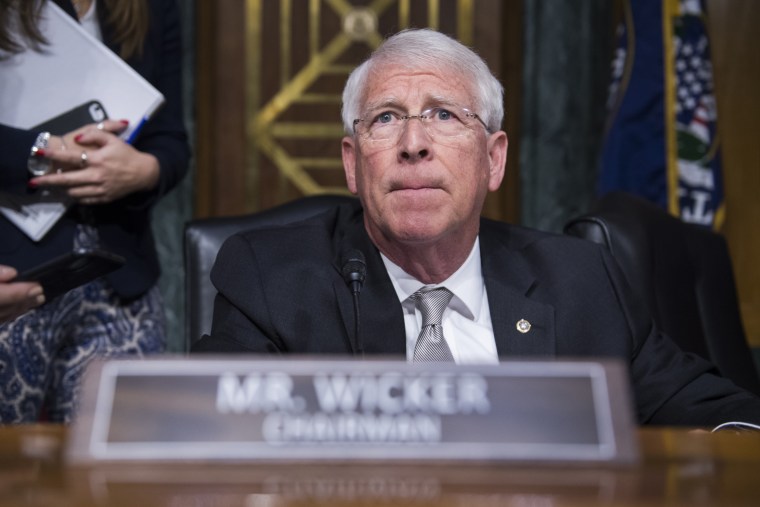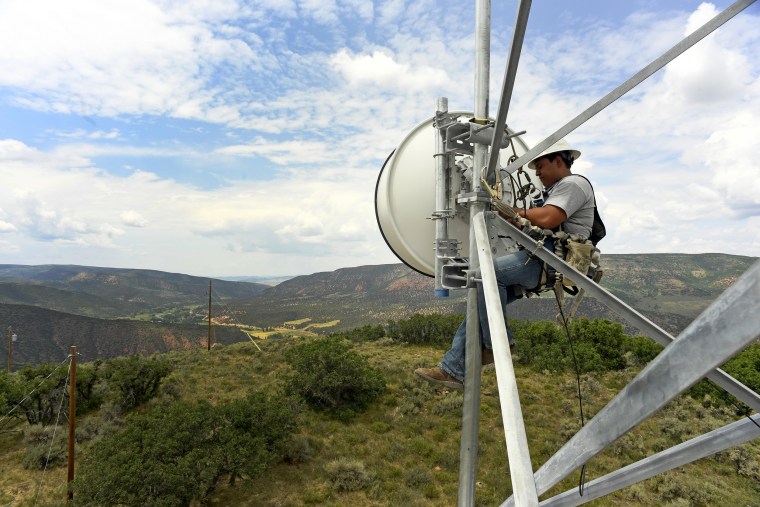The Trump administration's ban on goods produced by a Chinese tech giant would seem to have little to do with rural America. But rural cell service providers across the U.S. are almost entirely dependent on the company, Huawei, which produces inexpensive wireless communications equipment.
These small telecom companies now face billions of dollars in costs or the end of their businesses entirely after the Trump administration effectively banned the Chinese company last week over spying accusations.
It is a prospect that could leave vast swaths of rural America with no cell service.
In response, a bipartisan group of senators proposed legislation that would create a pool of $700 million to help local carriers replace their technology.

This legislation "offers relief to those providers that need to replace foreign equipment within their networks while augmenting the availability of secure 5G networks for all Americans," said Sen. Roger Wicker, R-Miss.
The problem is that $700 million is not nearly enough cash.
"We estimated that we needed $800 million to $1 billion for our carriers, but that only covers about a dozen companies," Carrie Bennet, general counsel for the Rural Wireless Association, told NBC News.
"I don't want to insult the bill they've introduced," she added. "It's great that someone has focused on what this is going to cost, but this is not enough money."
High price of rural wireless
The Huawei ban will force many wireless providers to turn to expensive European technology, as there are few American alternatives. Companies will have to rip out and replace everything they have already installed and hire highly-trained professionals to work on and install their network hardware.
That doesn't come cheap.
SI Wireless, a rural Kentucky and Tennessee provider with about 20,000 customers, would have to spend $40 to $60 million replacing its Huawei equipment, the company said in a FCC filing.
Viaero Wireless, with 110,000 customers in Colorado, Kansas, Nebraska, Wyoming and South Dakota, said 80 percent of its core equipment was produced by Huawei, according to the FCC filing. Replacing it could cost as much as $410 million.
Union Wireless has 40,000 customers across Wyoming, Colorado, Utah and Idaho. With 75 percent of its network equipment from Huawei, it would have to spend $300 million to comply.
Those are only a few of the dozens of companies that are affected by the ban.
Gigi Sohn, a former counselor to the FCC chairman in the Obama administration and currently a distinguished fellow at the Georgetown Law Institute for Technology Law and Policy, said lawmakers should be taking a wider view.
"If they can't use Huawei equipment, it's going to cost even more without a significant infusion — and $700 million ain't the answer," Sohn said. "These rural areas are going to not get served, and it puzzles me why these senators, many of whom are from states that are almost entirely rural, don't see the problem here."
Besides Wicker from Mississippi, the bill's Senate sponsors include Tom Cotton, R-Ark., Mark Warner, D-Va., Ed Markey, D-Mass., and Dan Sullivan, R-Alaska.
That this could potentially derail dozens of small American companies — disrupting service to millions of Americans — is no secret.
Almost exactly a year ago, several rural telecom companies warned in written testimony to the Federal Communications Commission that a ban on Huawei could effectively bankrupt them and force their customers to lose access to a consistent cellular network.
"The relative cost of both replacement and next-generation equipment will rise as a result of the proposed rule, as will the cost of borrowing," the Competitive Carriers Association wrote in an 86-page comment to the FCC in June 2018. "Lower-cost providers will be pushed out of the market, which will reduce overall supply and increase demand for the higher-cost providers."
Could major telecoms ensure rural access?
Major providers — companies like Verizon and AT&T — don't have a lot of incentive to cover rural areas, as it is expensive to serve a small number of people. In that market vacuum, local telecom companies have taken up the mantle to connect these rural communities.
That could change.
T-Mobile and Sprint, the third and fourth largest wireless providers respectively, have proposed a merger. To push the deal through and receive the FCC's blessing, the companies promised to provide a 5G network to 90 percent of the U.S. rural population "within six years of the merger's close," according to an FCC filing they submitted on Monday.
Bennet of the Rural Wireless Association said her organization "vehemently opposes the merger" largely because she thinks that they won't be able to deliver to rural customers, especially with that optimistic of a timeline and without the cheap Huawei technology.
"That they're going to be able to deliver any of that is so bogus," she said. "I don't know what they're smoking, but get me some of that."
Bennet isn't the only one unconvinced.
Sohn said T-Mobile and Sprint will tell the FCC nearly anything to get permission to proceed with the deal, especially since doubts have arisen about whether it will ever go through. Reuters reported last week that the Justice Department recommended blocking the deal.
"They're so desperate to get the merger they're making these wildly optimistic promises on build out," Sohn said. "But honestly, who is going to hold them to those promises?"
Unfortunately, it is going to be rural people who suffer if small providers disappear, Sohn said.
"If they go away, who is really, honestly going to be left to serve these communities?" she said.

